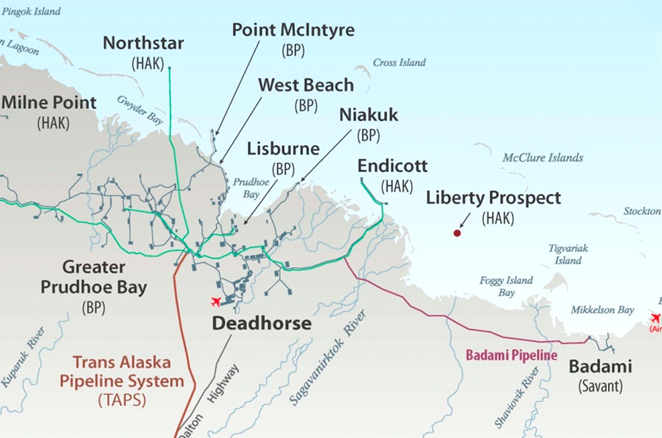EarthJustice, a perpetual lawsuit filer based in San Francisco, found fault with the federal government’s environmental impact statement approved for the Hilcorp Liberty project.
That proposed project is an offshore Arctic oil development being built in an area that is 6 meters deep in Foggy Island Bay, six miles offshore in the Beaufort Sea.
While no final investment decision has been made, Hilcorp proposes to build a gravel island to host a drilling operation. There are 18 of these drilling islands in Alaska, and this one has an expected production lifespan of up to 20 years.
Hilcorp is the lead company in Liberty, the largest undeveloped, light-oil reservoir on the North Slope, with an estimated 80-150 million barrels of recoverable oil. The peak production is expected to be between 60,000 and 70,000 barrels per day, within two years of initial production.

The field has a life expectancy of 15 to 20 years, and first oil is expected in 2023. Oil from Liberty would be piped into the Trans Alaska Pipeline System, where it would be subject to State royalties and taxes.
The fault with the project? It ignores climate change, say the lawyers of EarthJustice, which was formerly called the Sierra Club Legal Defense Fund.
Ignoring climate change is not only not provable, it’s not illegal in the United States. It’s like saying that the environmental lawsuit group ignores its lawsuits’ damage to Alaskans, their jobs, families, and the state’s economy. Again, not provable and not illegal. Winning such an argument in court would, as a result, make ignoring climate change subject to legal sanction.
EarthJustice says the approval of Liberty’s environmental impact statement also violates federal laws because, in essence, the government’s logic for approving the EIS was flawed.
[Read: Bureau of Ocean Energy Management’s Liberty project description]
The lawyers assert that the project was rubber stamped by the federal government.
But was it rubber stamped?
Liberty began in 1982 with Shell Oil, and has a 36-year history of documentation attached to it. Hilcorp acquired the project from BP in 2014, after BP decided to put it on the back burner, in spite of the 150 million million barrels that could be recovered.
The record of decision on the environmental impact statement was issued in October, 2018. Construction will require many more permits, and every single one of those will draw an EarthJustice lawsuit. If Hilcorp can run the litigious gauntlet, construction could start in 2020. First oil in 2023 means a project that will have been fighting lawsuits for 41 years.
The litigants also are challenging the project because they say it will endanger “imperiled polar bears.” Beaufort Sea-based polar bears have been in decline but scientists have linked that to the presence of fewer seals in the Beaufort, not to thinning ice.
The Hilcorp drilling platform includes an underwater pipeline that the litigants say is an oil spill risk that threatens wildlife and Arctic communities.
Recently a group of children sued the State of Alaska for its energy policy, saying the State was violating their constitutional rights by putting fossil fuel production above the safety of their lives. That climate change lawsuit was dismissed by a Superior Court judge and has been appealed to the Alaska Supreme Court. Our Children’s Trust is a national organization that is planning to sue governments over climate change in all 50 states.
Suing over climate change is a relatively new, but growing legal specialty that is based on speculation. Is oil production good for children or bad for them?
The Liberty lawsuit and the children’s lawsuit are weakly constructed and will likely lose. But the environmental justice industry hopes one of these lawsuits, or a part of a lawsuit eventually sticks and becomes case law upon which more lawsuits can be filed and won.
If the goal is to shut down the oil industry, such an outcome would also shut down Alaska’s natural gas potential, the entire Alaska economy, as well as the economy that is booming across the West due to new oil production technologies. The United States this year surpassed Russia and Saudi Arabia and is now the world’s largest crude oil producer. Climate change lawsuits can only be successful if oil is somehow classified as an illegal substance that must be kept in the ground.

“Imperiled polar bears” my ass. Polar bear populations are at an all time high. These animals adapt perfectly to change. Another smoke screen and frivolous lawsuit by out of work lawyers and environmentalists who can’t produce a decent fart.
Good one, Ed. Environmentalists are like the French aristocracy. Their farts don’t stink.
Actually, many of the environmentalists I’ve seen look and smell pretty stinky. A good bath, a haircut and a copy of the Art of the Deal would help them get a life.
Alaska should impose a carbon tax on the sarcophaguses “greenies” put on their Subarus. It is well documented Thule and Yakima products have a significant negative impact on MPG and are directly correlated to extravagant burning not only of gasoline but of extra calories that do nothing to improve the lives of the 99% – and contributes to HUMAN CAUSED GLOBAL WARMING!
Not to mention they are made of petrochemicals from who knows where. Is the source environmentally and socially responsible oil developments like Nigeria, Venezuela and Russia? In this day and age we should know where our petrochemicals originated from so that responsible consumers can make responsible choices.
How about a high-end recreational gear and equipment tax on any garments over Costco prices for the equivalent, say Patagonia and Arc’teryx. Pack rafts – WTF?!
Actually, I would like to see the tax laws changed.
Any 501-C3 that initiates litigation should lose it’s tax exempt status immediately. Lawyers are required to provide a certain amount of Pro Bono work, they provide that to the “non-profits” as in kind donation and take the deduction. Win-win, right?.
Lose the non-profit status, lose the free legal work. Now the rest of us can win.
Counter sue the bastards for harassment. There needs to be a precedent for punishing nuisance suits.
Comments are closed.